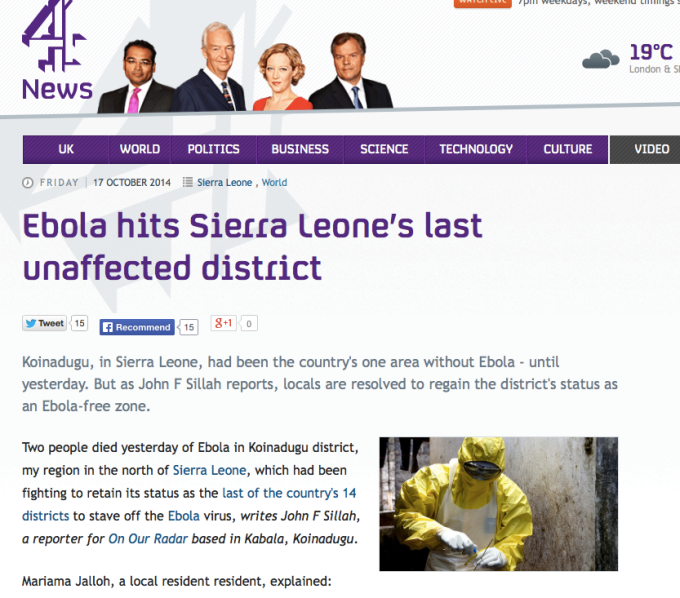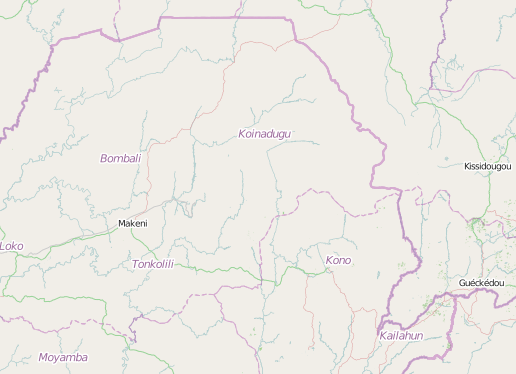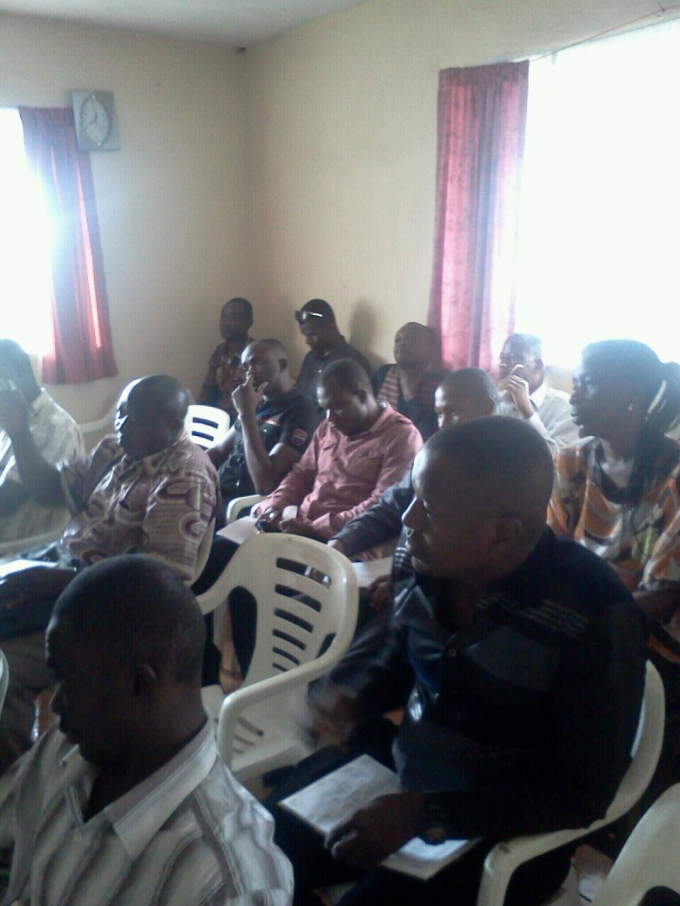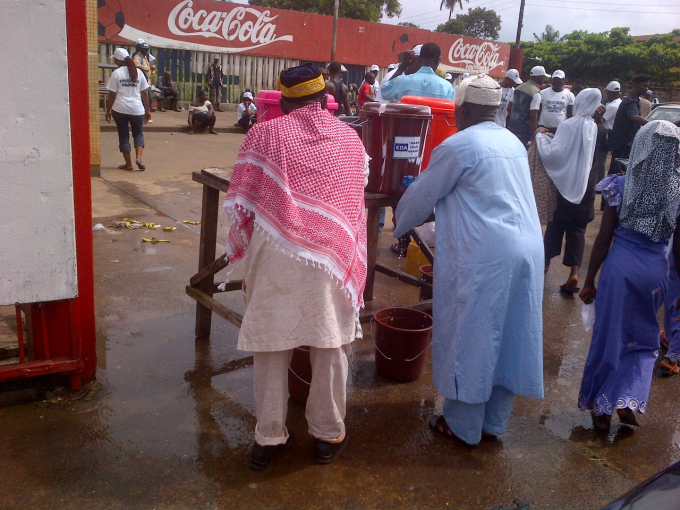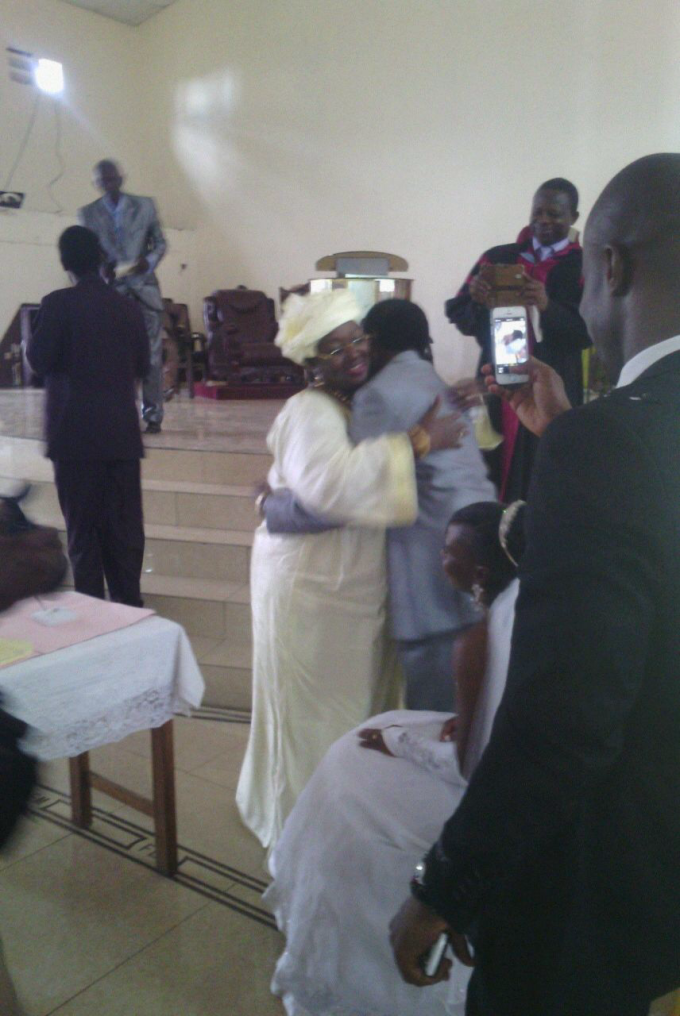
MONROVIA, Liberia – The United States and Britain will send medical equipment and military personnel to help contain West Africa’s Ebola outbreak, as the World Health Organization warned Monday that many thousands of new infections are expected in Liberia in the coming weeks.
The current Ebola outbreak is the largest on record. It has spread from Guinea to Sierra Leone, Liberia, Nigeria and Senegal and killed more than 2,000 people. An “exponential increase” in new cases is expected in the hardest-hit countries in coming weeks, the U.N. health agency warned.
“As soon as a new Ebola treatment facility is opened, it immediately fills to overflowing with patients, pointing to a large but previously invisible caseload,” WHO said in a statement about the situation in Liberia. “Many thousands of new cases are expected in Liberia over the coming three weeks.”
Military personnel will set up a 25-bed field hospital in the Liberian capital, Col. Steven Warren, a Pentagon spokesman, said Monday. The clinic will be used to treat health care workers, a high number of whom have become infected in this outbreak.
Once set up, the centre will be turned over to the Liberian government. There is no plan to staff it with U.S. military personnel, Warren said.
Liberia welcomed the news.
“This is not Liberia’s particular fight; it is a fight that the international community must engage very, very seriously and bring all possible resources to bear,” said Information Minister Lewis Brown.
In addition, Britain will open a 62-bed treatment centre in Sierra Leone in the coming weeks. It will be operated by military engineers and medical staff with help from the charity Save the Children, Britain’s Department for International Development said Monday.
The clinic will also include a special section for treating health care workers, offering them high-quality, specialist care, the statement said.
Currently, there are about 570 beds in Ebola treatment centres in Guinea, Sierra Leone and Liberia, the hardest-hit countries, and the World Health Organization says nearly 1,000 more are needed, the vast majority of those in Liberia.
Doctors Without Borders welcomed both the American and British announcements, but warned even the latest surge in efforts may not be enough, saying the disease was moving “catastrophically through the population much faster than new facilities are being created.”
And experts say it’s not just beds, but that more international and local health workers that are needed. Doctors Without Borders also urged Washington to not simply set up clinics but also to staff them.
Many health workers, however, have been reluctant to respond to the crisis out of concern that there isn’t enough protective equipment to keep them safe.
A fourth American who contracted Ebola in West Africa was expected to arrive in the U.S. for care Tuesday, Emory University Hospital — where two other aid workers successfully recovered from the disease — said Monday in a news release.
Ebola is spread through the bodily fluids of people who show symptoms, and doctors and nurses are at high risk of infection because they work closely with the sick. The WHO doctor whose infection was announced Monday is the second health care worker with the agency to catch Ebola. The doctor is in stable condition and will shortly be evacuated, the agency said.
In Liberia alone, 152 health care workers have been infected with Ebola and 79 have died, WHO said, noting that country had too few doctors and nurses even before the crisis.
“Every infection or death of a doctor or nurse depletes response capacity significantly,” it said.
U.N. Secretary-General Ban Ki-moon called several world leaders over the weekend, including the British prime minister and French president, to urge them to send more medical teams and money to fight the outbreak.
Officials have said flight bans and border closures — meant to stop the disease’s spread — are slowing the flow of aid and protective gear for doctors and nurses to the region.
At an emergency African Union meeting Monday, members agreed to open borders that have been closed and lift bans on flights to and from affected countries, according to Nkosazana Dlamini Zuma, chair of the AU’s Commission. But it was unclear how quickly those promises would be kept.
Earlier, Senegal, which has shut its borders and blocked flights, said it was planning to open a “humanitarian corridor” to the affected countries.
By Rewina Juduh
The Ministry of Internal Affairs through its Bureau of Customs and Culture and in collaboration with the National Council of Chiefs and Elders has announced the immediate suspension of all Poro and Sande activities throughout Liberia.
Sande, also known as zadεgi, bundu, bundo and bondo, is a women’s association found in Liberia, Sierra Leone andGuinea that initiates girls into adulthood, confers fertility, instills notions of morality and proper sexual comportment, and maintains an interest in the well-being of its members throughout their lives. In addition, Sande champions women’s social and political interests and promotes their solidarity vis-a-vis the Poro, a complementary institution for men. The Sande society masquerade is a rare and perhaps unique African example of a wooden face mask controlled exclusively by women – a feature that highlights the extraordinary social position of women in this geographical region.
The ministry says its attention has been drawn to reports of the continued operation of Poro and Sande societies in several parts of the country in violation of the moratorium placed on the operation of Poro and Sande Societies on June 2, 2014.
In a press release issued here, it said the decision then, and now, was intended to ensure that there is no outbreak of the Ebola virus in any Poro or Sande grove in Liberia.“This would be a disaster and it must be prevented in the interest of saving additional lives of our fellow citizens”, the release read. However, the ministry notes that in spite of its demonstration of understanding and accommodation, some individuals have continued to operate Poro and Sande Groves and conduct cultural festivals.
According to the press release signed by Minister Morris Dukuly, such practices in the face of the Ebola epidemic exposes citizens to increased incidents of the virus and untimely death. The ministry therefore directs that all such practices must cease and be seen to have ceased by September 17, 2014.
MIA warns that any grove which operates or reopens its doors to initiate persons will be seen to be in defiance of its General Circular No. 13 and its most recent statement, reaffirming the provisions of the General Circular.
The Ministry says, the two-week extension it is granted under this statement is to allow the smooth closure of all Poro and Sande Societies operating in the country, and should not be viewed as an extension of the term of existing graves.
It said any grove or society found operating beyond the September 17, 2014, date would be ordered immediately closed in keeping with cultural, traditional practices, and its guidelines and regulations, while persons operating such groves will be prosecuted under the laws of Liberia.
Meanwhile, the Minister of Internal Affairs is authorizing all county Superintendents, District Commissioners, County Inspectors, and other appropriate local government officers ensure full compliance with this directive, and to close uncooperative Sande and Poro Societies upon the expiration of the two-week extension period.
The release said the Minister of Internal Affairs has written to inform Chief Zanzan Karwor, Chairman of the National Council of Chiefs and Elders, of the directive, and requested the full cooperation of the council.
Monrovia – The deadly Ebola virus is spreading in Monrovia and beyond, touching the security sector as 18 Police officers have been quarantined in Bloc C at the Police Barracks in Monrovia.
According to sources, one Police officer serving the Police Support Unit (PSU) contracted the virus and is currently undergoing treatment at the ELWA Ebola center.
One senior Police source confirmed to FrontPageAfrica that the officer is in critical condition at the Ebola treatment center. The Police officer is said to have contracted the virus from his wife who is a nurse, who transferred the virus to her husband after also getting infested from work.
The health of the PSU officer prompted the quarantining of Bloc C of the Police barracks where accordingly the 18 Police officers are residing. Located at the intersection of Camp Johnson Road and Capitol By-pass the Police Barracks is home to several Police officers and their dependents.
According to one member of the Ebola Task Force, several items have been supplied the quarantined Police officers including chlorine, biscuits and other materials. Police officers are used in protecting clinics and other medical facilities also accompanying various medical teams, including burial, collection of sick patients and others.
The officers are usually not seen wearing protective gears including gloves and other PPEs while providing protection in medical facilities and carrying out other duties closely related to Ebola. Police officers are also used to implement quarantine in several communities as they were recently deployed to ensure the quarantine of the West Point community and some are now in Dolo’s Town, Margibi County performing similar duty.
United States based Centers for Disease Control has warned that up to 20,000 people will get infested with the virus before it is brought under control, but it seems the Liberian government does not agree with such prediction as President Ellen Johnson Sirleaf has publicly declared disagreement with the CDC’s prediction.
Despite disbursement of funding from the Ebola fund to the security sector including the Police, Police officers are not adequately catered for as some officers have complained that they do not receive daily per diems and other protective materials, thus making vulnerable to contracting the virus.







